备战2023中考英语语法知识梳理——专题十二简单句与主谓一致(河北)(共91张PPT)
文档属性
| 名称 | 备战2023中考英语语法知识梳理——专题十二简单句与主谓一致(河北)(共91张PPT) |  | |
| 格式 | pptx | ||
| 文件大小 | 2.0MB | ||
| 资源类型 | 教案 | ||
| 版本资源 | 人教新目标(Go for it)版 | ||
| 科目 | 英语 | ||
| 更新时间 | 2023-05-19 11:34:25 | ||
图片预览

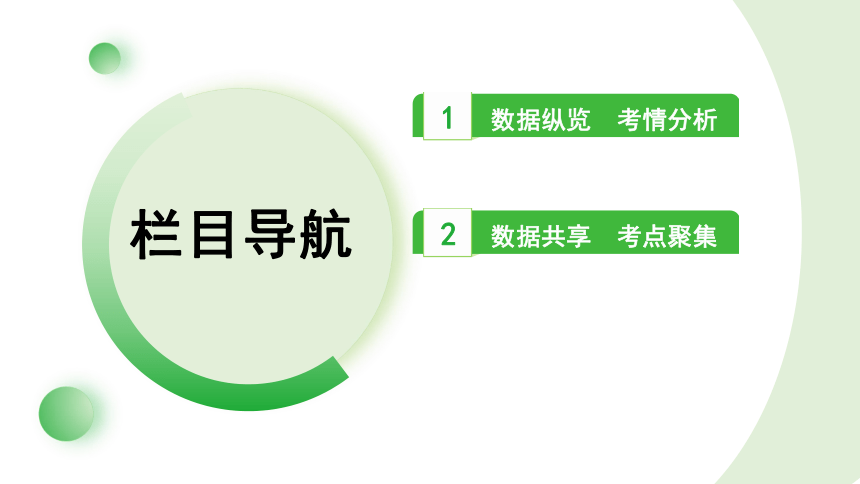
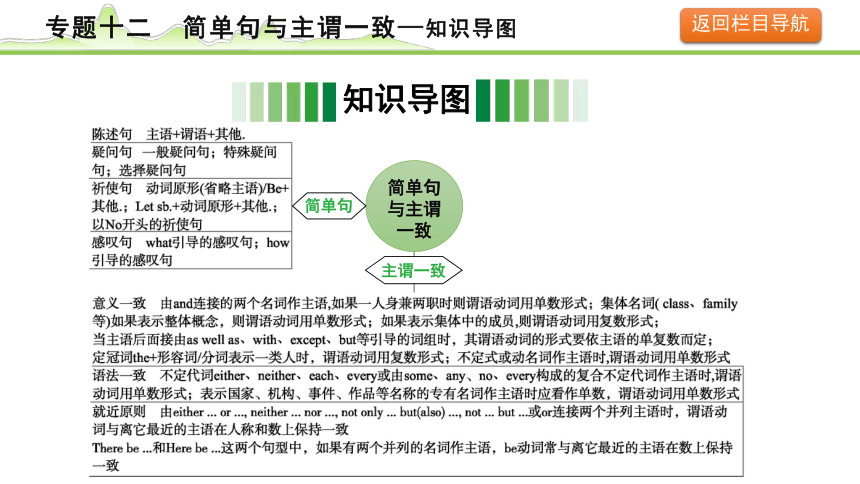
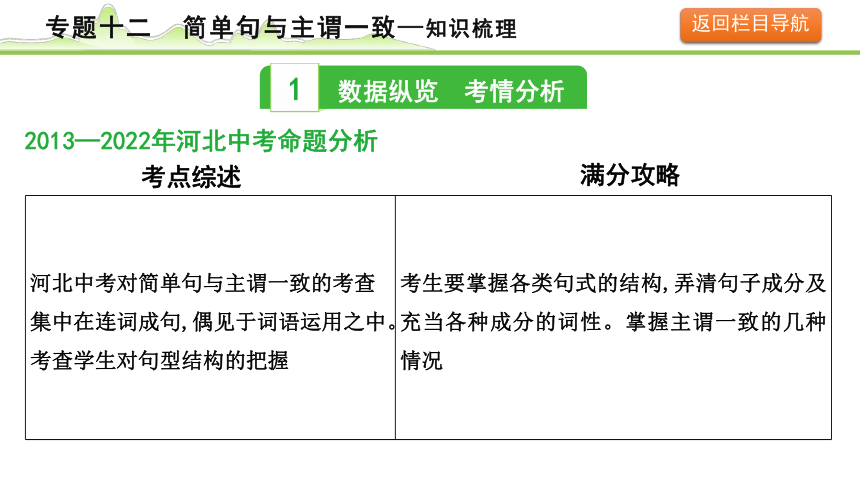
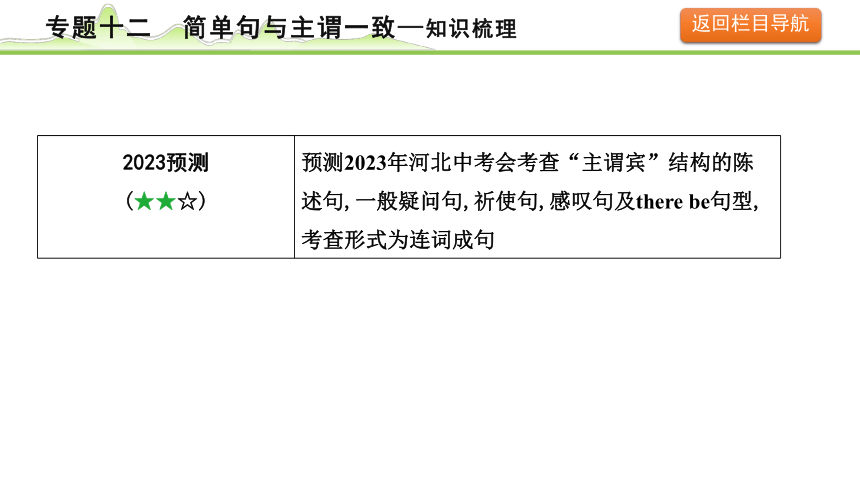

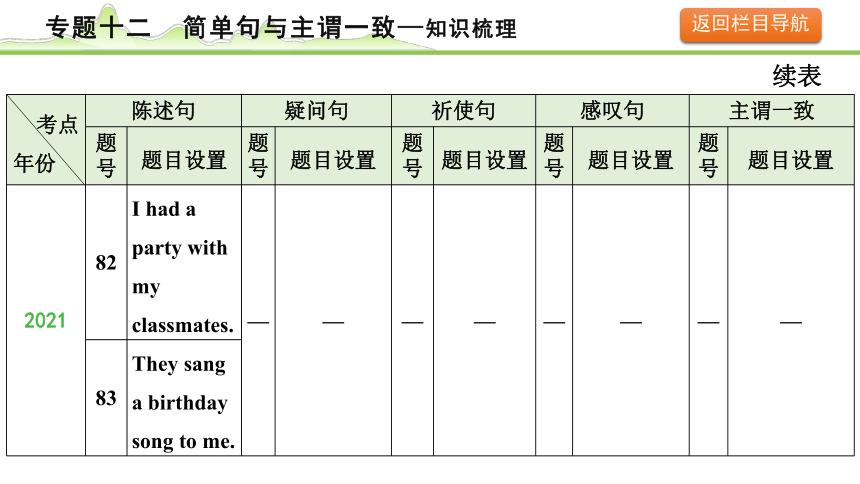
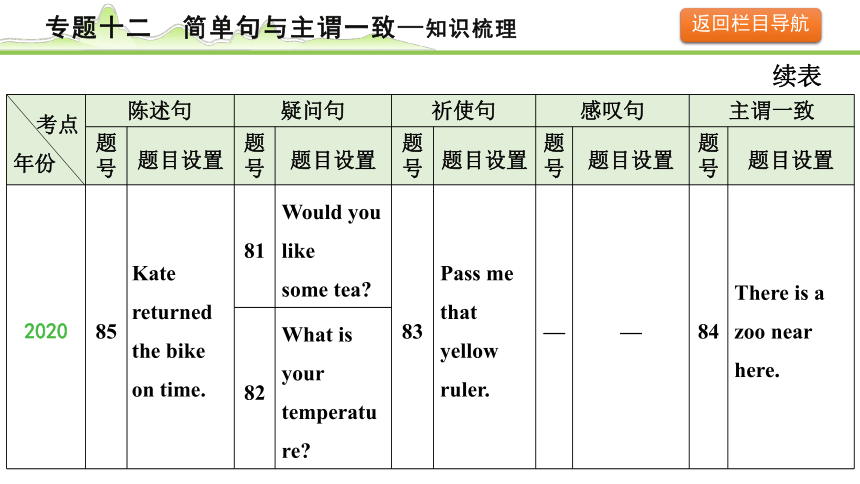

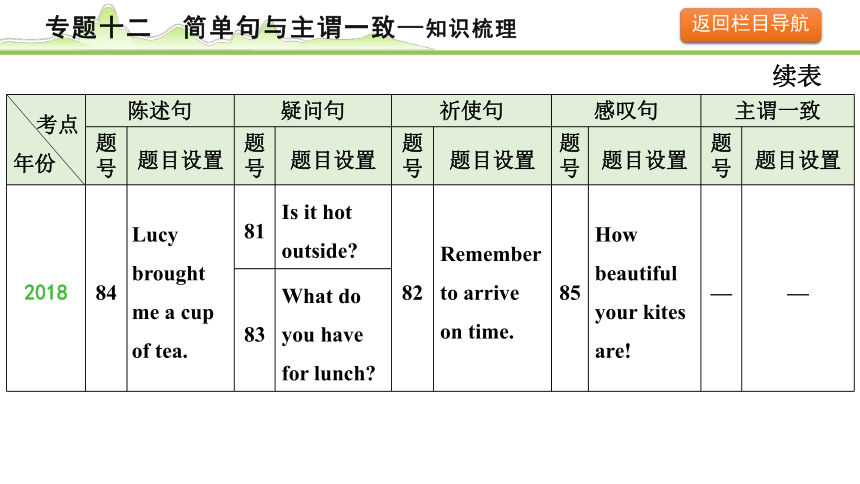
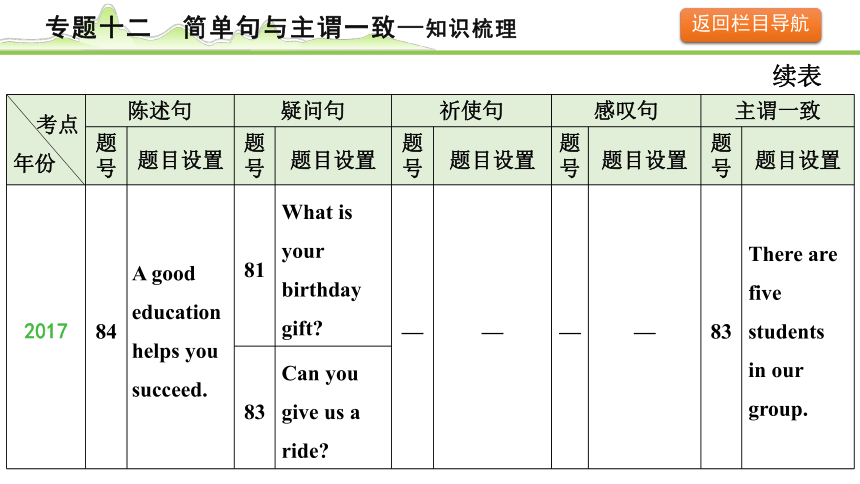
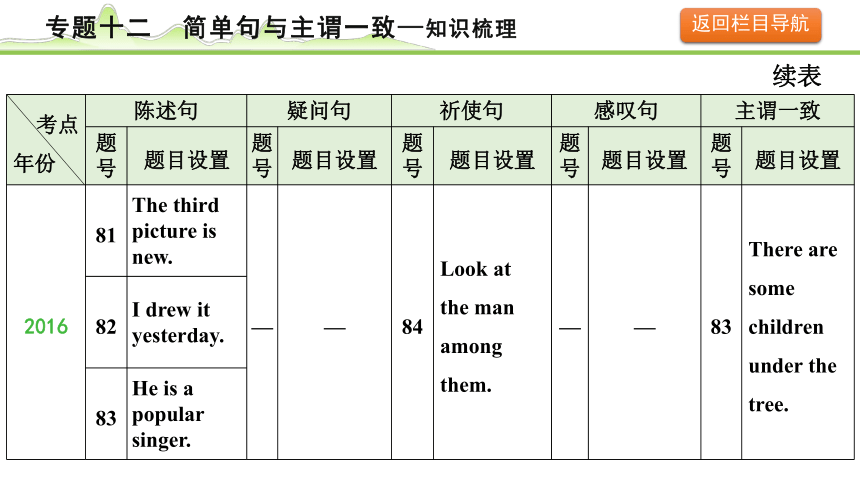
文档简介
(共91张PPT)
专题十二 简单句与主谓一致
专题十二 简单句与主谓一致
栏目导航
数据纵览 考情分析
1
数据共享 考点聚集
2
知识导图
简单句与主谓一致
简单句
主谓一致
2013—2022年河北中考命题分析
数据纵览 考情分析
1
河北中考对简单句与主谓一致的考查集中在连词成句,偶见于词语运用之中。考查学生对句型结构的把握 考生要掌握各类句式的结构,弄清句子成分及充当各种成分的词性。掌握主谓一致的几种情况
考点综述
满分攻略
2023预测 (★★☆) 预测2023年河北中考会考查“主谓宾”结构的陈述句,一般疑问句,祈使句,感叹句及there be句型,考查形式为连词成句
考点 年份 陈述句 疑问句 祈使句 感叹句 主谓一致
题号 题目设置 题号 题目设置 题号 题目设置 题号 题目设置 题号 题目设置
2022 82 I like the green trees. 84 What does it say 83 Look at the sign over there. 81 How beautiful the park is! — —
2021 81 It was my birthday yesterday. — — — — 85 What a great time we had! 84 There were lots of fun games.
续表
考点 年份 陈述句 疑问句 祈使句 感叹句 主谓一致
题号 题目设置 题号 题目设置 题号 题目设置 题号 题目设置 题号 题目设置
2021 82 I had a party with my classmates. — — — — — — — —
83 They sang a birthday song to me.
续表
考点 年份 陈述句 疑问句 祈使句 感叹句 主谓一致
题号 题目设置 题号 题目设置 题号 题目设置 题号 题目设置 题号 题目设置
2020 85 Kate returned the bike on time. 81 Would you like some tea 83 Pass me that yellow ruler. — — 84 There is a zoo near here.
83 82 What is your temperature
续表
考点 年份 陈述句 疑问句 祈使句 感叹句 主谓一致
题号 题目设置 题号 题目设置 题号 题目设置 题号 题目设置 题号 题目设置
2019 84 She took the teacher’s advice. 81 Where is my cup 82 Wish you good luck. 83 What a beautiful day it is! — —
续表
考点 年份 陈述句 疑问句 祈使句 感叹句 主谓一致
题号 题目设置 题号 题目设置 题号 题目设置 题号 题目设置 题号 题目设置
2018 84 Lucy brought me a cup of tea. 81 Is it hot outside 82 Remember to arrive on time. 85 How beautiful your kites are! — —
83 What do you have for lunch
续表
考点 年份 陈述句 疑问句 祈使句 感叹句 主谓一致
题号 题目设置 题号 题目设置 题号 题目设置 题号 题目设置 题号 题目设置
2017 84 A good education helps you succeed. 81 What is your birthday gift — — — — 83 There are five students
in our group.
83 Can you give us a ride
续表
考点 年份 陈述句 疑问句 祈使句 感叹句 主谓一致
题号 题目设置 题号 题目设置 题号 题目设置 题号 题目设置 题号 题目设置
2016 81 The third picture is new. — — 84 Look at the man among them. — — 83 There are some children under the tree.
82 I drew it yesterday.
83 He is a popular singer.
续表
考点 年份 陈述句 疑问句 祈使句 感叹句 主谓一致
题号 题目设置 题号 题目设置 题号 题目设置 题号 题目设置 题号 题目设置
2015 81 I went on a trip yesterday. — — — — 85 What a wonderful time we had! 83 There were many interesting activities.
82 It was my first school trip.
83 We sang happily on the way.
续表
考点 年份 陈述句 疑问句 祈使句 感叹句 主谓一致
题号 题目设置 题号 题目设置 题号 题目设置 题号 题目设置 题号 题目设置
2014 88 I gave him a birthday gift. 86 Did it rain last night — — 89 What beautiful flowers they are! — —
90 Nancy plays tennis twice a week. 87 What size is your shirt
续表
考点 年份 陈述句 疑问句 祈使句 感叹句 主谓一致
题号 题目设置 题号 题目设置 题号 题目设置 题号 题目设置 题号 题目设置
2013 87 The noodles taste good. 86 Do you have a ruler 89 Pass her those black pens. — — 90 There is a football match on TV now.
90 Nancy plays tennis twice a week. 88 How far is the museum
续表
数据共享 考点聚焦
2
陈述句
疑问句
祈使句
感叹句
主谓一致
情景交际
考点 一
考点 二
考点 三
考点 四
考点 五
考点 六
陈述句
考点考法强化
1. (2022·连云港期中) The printer doesn’t today .You can’t use it now.
A. works B. worked C. working D. work
2. (2022·广西崇左一模改编) — Shall we meet at the station at 8 a.m.
— In fact, we don’t have to. The train until 10 a.m.
A. doesn’t leave B. leaves C. will leave
D
A
1
5
2
3
4
考点 一
3. (原创) My mother like salad.
A. don’t B. doesn’t C. isn’t D. aren’t
4. (原创) You’d better eat or talk loudly in the reading room. It’s not allowed.
A. don’t B. not C. not to D. to not
B
B
1
5
2
3
4
5. (原创) — Dear, I have an important meeting tomorrow.
— It doesn’t matter. If you go to the movie tomorrow, I my friend to go with me.
A. don’t; will ask B. won’t; will ask C. don’t; ask D. won’t; ask
A
1
5
2
3
4
学法方法点拨
陈述句用来陈述一件事或表达一种看法,有肯定和否定两种形式,句末通常用句号,读降调。
(一)陈述句的肯定式
结构:主语+谓语+其他.
That boy often helps others. 那个男孩经常帮助别人。
(二)陈述句的否定式
1.句中如有be动词、助动词或情态动词时,可直接在这些词的后面加not。
She is not a teacher. 她不是一名老师。
Tom can’t speak Japanese. 汤姆不会说日语。
2.句中如果没有be动词、助动词或情态动词时,要根据人称及时态用助动词don’t、doesn’t或didn’t来表示否定。
The boy doesn’t do housework at home.
这个男孩在家不做家务。
3.除not外,其他否定词或结构也可以构成否定句,如no、never、little、few、nobody、no one、nothing、none、neither、hardly、seldom、too … to …等。
I have never seen such a man.
我从没见过这样的一个男人。
I seldom eat hamburgers. 我极少吃汉堡包。
He was too late to catch the bus.
他太迟了以至于没赶上公共汽车。
考点考法强化
1. (2022·唐山路南区三模) — I’m terribly sorry for being late. have you waited for me
— Never mind. I have just arrived myself.
A. How often B. How soon C. How far D. How long
D
疑问句
8
12
9
10
11
7
6
4
2
1
5
3
考点 一
2. (2022·深圳模拟改编) — is the town square
— It covers 600 square meters!
A. How wide B. How long C. How large D. How old
3. (2022·三明三元区模拟改编) — Is Anna watching TV in the room
— . She is doing her homework.
A. Yes, she is B. Yes, she does C. No, she isn’t D. No, she doesn’t
C
C
8
12
9
10
11
7
6
4
2
1
5
3
4. (2022·佳木斯前进区模拟改编) — Ann like pandas
— Yes, she .
A. Does; like B. Does; does C. Does; do D. Does; likes
5. (2022·天津静海区校级模拟) — What does your best friend look like
— ____
A. She’s a student. B. She likes music.
C. She is kind. D. She is tall with long hair.
B
D
8
12
9
10
11
7
6
4
2
1
5
3
6. (2022·广西模拟) — Hi, Andy! Long time no see.
— Pretty good.
A. What are you doing B. Where did you go
C. What’s the matter D. How is it going
7. (2022·武威凉州区期中) — ____
— He is a teacher. He teaches us math.
A. Where is he B. Why does he want to be a teacher
C. What does he do D. How old is he
D
C
8
12
9
10
11
7
6
4
2
1
5
3
8. (2022·长春宽城区一模) — Is Beijing or Tokyo the first city to host both the Summer and Winter Olympic Games
— . I am proud to be Chinese.
A. Yes, it is B. No, it isn’t C. Beijing D. Tokyo
9. (2022·长春二道区校级模拟) — Kelly,did you go to the countryside with your family by car or by bike
— . I think it is good exercise.
A. Yes, I did B. No, I didn’t C. By bike D. By car
C
C
8
12
9
10
11
7
6
4
2
1
5
3
10. (2022·重庆三模) — are you leaving for Chongqing
— In two weeks.
A. How soon B. How long C. How many D. How much
11. (2022·上海浦东新区二模) — do you usually wake up in the morning
— At about half past five.
A. What about B. What time C. How soon D. How fast
A
B
8
12
9
10
11
7
6
4
2
1
5
3
12. (2022·温州平阳县二模) — will the Whites return from France
— In a week I think. They’ll have an important meeting next week.
A. How long B.How soon
C. How fast D. How often
B
8
12
9
10
11
7
6
4
2
1
5
3
学法方法点拨
用来提问的句子叫作疑问句,句末用问号。初中英语阶段常见疑问句分为一般疑问句、特殊疑问句和选择疑问句。
1. 一般疑问句
一般疑问句表示询问事物或某种情况是否属实,需要用肯定(yes)或否定(no)回答,读时用升调。
一般疑问句作肯定回答时,通常是: Yes,主语+be动词/助动词/情态动词;作否定回答时,通常是: No,主语+be动词/助动词/情态动词+not,not一般要与前面的词语构成缩略形式。
— Are you happy 你开心吗
— Yes, I am. 是的,我开心。/— No, I’m not. 不,我不开心。
— Can you swim 你会游泳吗
— Yes, I can. 是的,我会。
— No, I can’t. 不,我不会。
注意:一般疑问句通常是怎么问,怎么答,即用什么词提问,就用什么词回答,但有下列情况时例外。
① 用其他词语代替yes或no来回答,从而使语气变得客气、委婉。
— May I borrow your ruler 我可以借你的尺子吗
— Sure. Here you are. 当然了。给你。
② 否定的一般疑问句通常是以be动词、情态动词或助动词与not的缩略形式开头,通常用于表示惊讶、赞叹、怀疑等语气。对否定的一般疑问句作简略回答时也用yes或no,但其汉语翻译与其原意正好相反。
— Don’t you hear of that (表示惊讶)你没有听说过那件事吗
— Yes, I do. 不,我听说过。
— No, I don’t. 是的,我没有听说过。
2. 特殊疑问句
用疑问词引导的疑问句叫特殊疑问句。由“疑问词+一般疑问句”构成,回答时不能使用yes或no,要根据实际情况作出回答,读降调。
疑问词包括疑问代词、疑问副词和疑问词组。
①疑问代词: what(什么)、who(谁)、which(哪一个)、whose(谁的)、whom(宾格“谁”), 可以对主语、表语、宾语提问。
What do you want to eat 你想吃什么
②疑问副词: when(何时)、where(何地)、why(为什么)和how(怎么样), 用于对状语提问。
Why are you late again 你为什么又迟到了
③疑问词组:how soon、how long、how far、how often、what color等。
— How soon will the concert begin 再过多久音乐会才会开始
— In twenty minutes. 再过二十分钟。
3. 选择疑问句
提出两种或两种以上的情况,要求对方选择一种情况回答的问句叫选择疑问句。选择疑问句中的两种或两种以上的情况用or连接,回答时不能使用yes或no,要根据实际选择作答。语调一般是前升后降。选择疑问句可以分为一般选择疑问句和特殊选择疑问句两种。
①一般选择疑问句:一般疑问句+or+被选择部分
— Is he tall or short 他长得高还是矮
— He is tall. 他长得高。
②特殊选择疑问句:特殊疑问句,A or B 回答时可以依据实际情况使用不定代词either、neither、any或 none。
— Which do you prefer, tea or milk 你比较喜欢哪个,茶还是牛奶
— Neither, I like juice. 两个都不喜欢,我喜欢果汁。
考点考法强化
1. (2022·广元) — silent, please! You are in the library.
— I’m sorry, madam.
A. Keep B. To keep C. Keeping D. Kept
2. (2022·泸州龙马潭区模拟) to the teacher carefully, or you’ll miss what he says.
A. Listening B. Listen C. Listened D. To listen
A
祈使句
B
3
7
4
5
6
2
1
考点 三
3. (2022·福州二模改编) a list of things you want to buy before you go shopping. That will save you a lot of time and money.
A. Make B. Making C. To make D. To make
4. (2022·济南历下区二模) — Tommy, me some bread. I’m a little hungry.
— OK, Mom.
A. brings B. bringing C. to bring D. bring
A
D
3
7
4
5
6
2
1
5. (2022·绥化三模) trying and encouraging yourself if you want to succeed in something.
A. To keep B. Keeping C. Keep
6. (2022·深圳模拟) — John, forget to close the windows when you leave.
— I won’t.
A. don’t B. isn’t C. didn’t D. not
C
A
3
7
4
5
6
2
1
7. (2022·北京海淀区校级期中) . They are having a meeting.
A. No saying B. Not be so noisy
C. Mustn’t talk D. Be quiet
D
3
7
4
5
6
2
1
学法方法点拨
祈使句通常被用于表示命令、请求或禁止的语气,还可用于表示警告、邀请、建议、指路等。祈使句亦可用来表示条件,常用于“祈使句+and/or+陈述句”句型中。
Hurry up, or you’ll be late. 快点,否则你会迟到的。
祈使句的形式
1.肯定的祈使句
①动词原形(省略主语)/Be+其他.有时为了加强语气,可以在动词之前加上do,表示“务必,一定”。
Come in!进来!
Be quiet!安静!
Do look out!一定要小心!
②Let sb. +动词原形+其他.
Let him have a try. 让他试试。
2.否定的祈使句
①Don’t+动词原形+其他.
Don’t be late. 不要迟到。
Don’t go out. 别出去。
②Let sb. +not+动词原形+其他.
Let’s not start so early. 我们不要那么早开始。
3.结构比较特殊的祈使句
①在意思较为明显的情况下,可把谓语动词省去。
This way, please. 请这边走。
②某些名词、形容词或副词等后面加感叹号,也可作为祈使句使用。
Hands up!举起手来!
One moment, please! 请稍等!
Taxi!出租车!
③以no开头的祈使句的结构为“No+v.-ing/n.”,它通常用于公共场所的提示语中,表示“禁止做某事”。
No parking!不准停车!
No photos!禁止拍照!
考点考法强化
1. (2022·重庆) a fresh spring morning it is!
A. Who B. Why C. What D. How
2. (2022·广元) — Have you watched Wang Yaping’s science lecture(讲座) from China’s space station
— Yes. interesting it is!
A. How B. How a C. What D. What a
C
感叹句
A
1
5
2
3
4
考点 四
3. (2022·宿迁) clever girl Kitty is! She can come up with some creative ways to finish the project.
A. What B. How a C. How D. What a
4. (2022·兴义市二模) Look! happily they are playing on the playground!
A. How B. What C. How a D. What a
D
A
1
5
2
3
4
5. (2022·济南槐荫区模拟) — interesting magazine!
— Yes. I like it, too.
A. What B. What a
C. What an D. How
C
1
5
2
3
4
学法方法点拨
感叹句是用来表达情感的特殊句式。常见的感叹句由what或how引导,句末常用“!”。
1. what引导的感叹句
①What+a/an+形容词+可数名词的单数+主语+谓语!
What a wonderful movie it is! 它是一部多么精彩的电影啊!
②What+形容词+可数名词的复数/不可数名词+主语+谓语!
What excellent students they are! 他们是多么优秀的学生啊!
What exciting news it is! 多令人兴奋的消息啊!
2. how引导的感叹句
①How+形容词或副词+主语+谓语!
How fast he runs!他跑得多快啊!
②How+形容词+a/an+可数名词的单数+主语+谓语!
How interesting a story it is!它是一个多么有趣的故事!
③How+主语+谓语!
How time flies!光阴似箭!
How I want to be a doctor!我多么想成为一名医生啊!
考点考法强化
1. (2022·自贡模拟改编) Not only my father but also my grandpa ____ looking forward to flying to Singapore this weekend.
A. are B. is C. have been D. were
2. (2022·天水麦积区模拟) Mr. Wang together with his children in Tianshui.
A. enjoys living B. enjoy living C. enjoy to live D. enjoys live
B
主谓一致
A
18
22
19
20
21
13
17
14
15
16
12
7
11
8
9
10
2
6
3
4
5
1
考点 五
3. (2022·抚顺顺城区模拟) — We are very busy, so either you or Mary ____ going with Mom for shopping.
— I’ve got it, Dad.
A. does B. do C. is D. are
4. (2022·长春二道区校级模拟) John, as well as his parents, fishing every Saturday.
A. is going B. go C. goes D. went
C
C
18
22
19
20
21
13
17
14
15
16
12
7
11
8
9
10
2
6
3
4
5
1
5. (2022·铜仁碧江区一模) This pair of socks soft. I’ll take .
A. feel; it B. feels; it C. feels; them D. feel; them
6. (2022·日照五莲县期中) Sometimes Tom with his parents after dinner, but now they books.
A. is watching; read B. watches; are reading
C. watch; are reading D. watches; read
C
B
18
22
19
20
21
13
17
14
15
16
12
7
11
8
9
10
2
6
3
4
5
1
7. (2022·太仓市一模) As common sense, children’s development in social activities, athletics and hobbies just as important as achievements in study.
A. is B. are C. was D. were
8. (2022·常州天宁区一模) This English book, together with its listening material, well.
A. sells B. sell C. is sold D. are sold
A
A
18
22
19
20
21
13
17
14
15
16
12
7
11
8
9
10
2
6
3
4
5
1
9. (原创) Because of too much homework, neither Mary nor James to the cinema to have a good time.
A. goes B. doesn’t go C. don’t go D. go
10. (原创) Two months a long time. We can visit our grandparents during the vacation.
A. am B. is C. are D. have
A
B
18
22
19
20
21
13
17
14
15
16
12
7
11
8
9
10
2
6
3
4
5
1
11. (原创) Not only children but also my husband crazy about pop music.
A. is B. are C. am D. be
12. (原创) Neither Tom nor I interested in playing computer games.
A. am B. is C. are D. be
13. (原创) This pair of glasses mine.
A. are B. be C. is D. will be
A
A
C
18
22
19
20
21
13
17
14
15
16
12
7
11
8
9
10
2
6
3
4
5
1
14. (原创) There a pen, two pencils and three books on the desk.
A. are B. is C. has D. have
15. (原创) Mary as well as her sisters Chinese in China.
A. are studying B. have studied C. studies D. study
16. (原创) Either Jane or Steven watching TV now.
A. were B. is C. was D. are
B
C
B
18
22
19
20
21
13
17
14
15
16
12
7
11
8
9
10
2
6
3
4
5
1
17. (原创) Two days enough for me to finish the work. I need a third day.
A. isn’t B. is C. aren’t D. are
18. (原创) — How many lessons do you usually have a day
— Six lessons a day. And each of them 45 minutes.
A. last B. lasts C. have D. are
19. (原创) Neither Lily nor I a basketball player.
A. am B. is C. be D. are
A
B
A
18
22
19
20
21
13
17
14
15
16
12
7
11
8
9
10
2
6
3
4
5
1
20. (原创) There many new words in Lesson One. It is very easy.
A. is B. aren’t C. isn’t D. are
21. (原创) The number of the students in our school 1,200.
A. is B. are C. has D. have
22. (原创) Math my favorite subject.
A. be B. is C. am D. are
B
A
B
18
22
19
20
21
13
17
14
15
16
12
7
11
8
9
10
2
6
3
4
5
1
学法方法点拨
原则 说明 例句
意义一致 由and连接的两个名词作主语,如果一人身兼两职时则谓语动词要用单数形式 A singer and dancer is coming to our party. 一位歌手兼舞者将来参加我们的聚会。
功能 知识拓展 例句
意义一致 集体名词(如army、audience、cattle、class、club、crowd、family、government、group、people、police、public、staff、team等)如果表示整体概念,则谓语动词用单数形式;如果表示集体中的成员,则谓语动词用复数形式。其中cattle、people、police一般看成复数形式 His family are watching TV now. 他的家人正在看电视。
His family is big. 他有一个大家庭。
The police are helping a girl look for her mother. 警察正在帮助一个女孩找妈妈。
续表
考点考法强化
1. (2022·广元) — Would you like to go to the movies with me tonight
— I have to prepare for my English test.
A. Yes, I would. B. I’m afraid not. C. Never mind. D. I’d love to.
2. (2022·武汉) — Can I have two tickets for the Chinese Poetic Dance
— . All the tickets have been sold out.
A. I’m sorry B. Of course C. Never mind D. Thank you
B
情景交际
A
20
24
21
22
23
15
19
16
17
18
14
8
12
9
10
11
3
7
4
5
6
2
13
1
考点 六
3. (2022·武汉) — Would you like to visit the National Science Museum with me tomorrow, Amy
— .
A. See you then B. Sounds nice C. Excuse me D. I hope not
4. (2022·新疆) — Don’t forget to keep a safe social distance(距离) in public places, Tony!
— .
A. Sorry, I won’t B. Never mind C. Not at all D. I hope not
B
A
20
24
21
22
23
15
19
16
17
18
14
8
12
9
10
11
3
7
4
5
6
2
13
1
5. (2022·乐山改编) — Wow, look at the notice. Tina won the first prize of the English Spelling Competition.
— ____
A. That’s a pity.
B. That’s cool.
C. That’s all.
D. I’m sorry to hear that.
B
20
24
21
22
23
15
19
16
17
18
14
8
12
9
10
11
3
7
4
5
6
2
13
1
6. (2022·岳阳改编) — Long time no see, Angela. How’s it going
— , thank you.
A. It doesn’t matter B. The same to you
C. Pretty good D. Thanks a lot
7. (2022·天津) — Do you know about rock music
— . Ask Robert. He is a fan of rock music.
A. No idea B. No wonder C. No way D. No problem
C
A
20
24
21
22
23
15
19
16
17
18
14
8
12
9
10
11
3
7
4
5
6
2
13
1
8. (2022·黄石) — Would you mind handing me a pair of chopsticks
— . Here you are.
A. My pleasure
B. Yes, I’d love to
C. That’s all right
D. Of course not
C
20
24
21
22
23
15
19
16
17
18
14
8
12
9
10
11
3
7
4
5
6
2
13
1
9. (2022·宿迁) — Would you like to go to the youth centre with me tomorrow
— I can’t wait for the robot show there.
A.Yes, that’s right. B. Sure, I’d love to.
C. Of course not. D. Not at all.
B
20
24
21
22
23
15
19
16
17
18
14
8
12
9
10
11
3
7
4
5
6
2
13
1
10. (2022·扬州) — My pet dog died yesterday. I’m in a bad mood.
— . I know how it feels.
A. Sorry to hear that
B. That’s not the case
C. Never mind
D. It’s a pleasure
A
20
24
21
22
23
15
19
16
17
18
14
8
12
9
10
11
3
7
4
5
6
2
13
1
11. (2022·怀化) — Would you like to go to the history museum with me
— .
A. Sure, I’d love to B. Yes, I do C. That’s right
12. (2022·武威) — Hi, Mary. You look tired. ____
— I missed the school bus so I had to run to school this morning.
A. What happened B. What a pain!
C. You’re kidding. D. How about you
A
A
20
24
21
22
23
15
19
16
17
18
14
8
12
9
10
11
3
7
4
5
6
2
13
1
13. (2022·武威) — Happy birthday to you, Mary.
— ____
A. Have a nice day. B. See you.
C. The same to you. D. Thank you.
14. (2022·武威) — I don’t think sixteen-year-olds should be allowed to smoke.
— It’s bad for the teens’ health.
A. I agree. B. I hope so. C. I disagree. D. I hope not.
D
A
20
24
21
22
23
15
19
16
17
18
14
8
12
9
10
11
3
7
4
5
6
2
13
1
15. (2022·云南) — Hello, boys and girls! I’m your new teacher. ____
— Nice to meet you, too.
A. Nice to meet you.
B. What’s your name
C. Good morning.
D. How are you
A
20
24
21
22
23
15
19
16
17
18
14
8
12
9
10
11
3
7
4
5
6
2
13
1
16. (2022·昆明) — This is Jenny speaking. May I speak to Dr. Wang
— . I’ll tell him to call you back.
A. Have a good trip
B. This is Dr. Wang speaking
C. I’m glad to hear that
D. Sorry, he is not available now
D
20
24
21
22
23
15
19
16
17
18
14
8
12
9
10
11
3
7
4
5
6
2
13
1
17. (2022·济南) — We are free this Saturday. What about visiting the museum
— ____
A. Sounds great.
B. Never mind.
C. Not at all.
D. Lucky you.
A
20
24
21
22
23
15
19
16
17
18
14
8
12
9
10
11
3
7
4
5
6
2
13
1
18. (2022·温州)— Dad,we ll play against a strong team in tomorrow’s football match.
— ! Just try your best!
A. Good idea B. Come on C. Thank you D. Wait a minute
19. (2022·昆明) — Please be quiet. We are in the library.
— .
A. Well done B. OK, I will C. Enjoy yourself D. Long time no see
B
B
20
24
21
22
23
15
19
16
17
18
14
8
12
9
10
11
3
7
4
5
6
2
13
1
20. (2022·云南) — I’m sorry, Bill. I took your notebook by mistake.
— . They look almost the same.
A.You’re not right
B. It doesn’t matter
C. I hope not
D. I’m not sure
B
20
24
21
22
23
15
19
16
17
18
14
8
12
9
10
11
3
7
4
5
6
2
13
1
21. (2022·武威) — Shall we have an outdoor graduation party after the exam
— I think everyone will love it.
A. Good idea. B. No way.
C. Enjoy yourself. D. The same to you.
A
20
24
21
22
23
15
19
16
17
18
14
8
12
9
10
11
3
7
4
5
6
2
13
1
22. (2022·丹东) — Mom, I helped a little girl find her way home.
— !
A. Well done B. Have a good day C. What a pity D. Good luck
23. (2022·遂宁) — I think teenagers should sleep at least 8 hours every day.
— Enough sleep is good for their health.
A. I agree with you. B. I don’t think so.
C. It doesn’t matter. D. I don’t mind.
A
A
20
24
21
22
23
15
19
16
17
18
14
8
12
9
10
11
3
7
4
5
6
2
13
1
24. (2022·达州) — Ruby, could you please help me solve these problems
— , but still half are left for you to do by yourself.
A. I don’t think so
B. I hope not
C. With pleasure
D. It’s my pleasure
A
20
24
21
22
23
15
19
16
17
18
14
8
12
9
10
11
3
7
4
5
6
2
13
1
学法方法点拨
初中英语常用情景交际用语:
一、 感谢
1.表示感谢的常用语
Thank you (very much). /Thank you for …
Thanks (a lot)/(a million).
2.对感谢的应答
You’re welcome./Not at all.
It’s a/my pleasure. I’m glad I could do it.
That’s OK/all right.
二、 道歉
1.表示道歉的常用语
Excuse/Pardon me for … /I’m really sorry for …
2.打扰或麻烦别人时的常用语
Excuse me, please. /Excuse me, …
3.对道歉的应答
That’s OK/all right. /It doesn’t matter.
Never mind./It’s nothing (serious).
三、 邀请
1.表示邀请的常用语
Will/Would/Can/Could you come to …
Would you like to …
May I invite you to …
What/How about …
I’d like you to come to …
2.接受邀请的常用语
Yes, I’d love/like to. Thanks./Thank you.
Yes, it’s very kind/nice of you.
That sounds good/great/fun/nice.
3.拒绝邀请的常用语
I’d love to, but …
I’m afraid I can’t. Because …
It’s very kind/nice of you. But …
I’m sorry I can’t. I have to …
No, thank you.
四、 请求允许
1.表示请求允许的常用语
Can/Could/May I … (直接问句)
Would/Do you mind if I do … (委婉问句1)
I wonder if I could/can … (委婉问句2)
2.表示同意请求或允许的常用语
①直接问句的常用答语
Yes./Sure./Certainly.
Of course, you may.
Yes, do please.
Go ahead, please.
That’s OK./That’s all right.
②委婉问句1的常用答语
No, I don’t mind.
Certainly not./Of course not.
No, go ahead.
Not at all.
②委婉问句2的常用答语
Sure, go ahead./Yes, please do.
Yes./Of course./Certainly.
3.表示不同意请求或不允许的常用语
① 直接问句的常用答语
No, please don’t.
I’m sorry you can’t.
I’m sorry, but …
You’d better not …
②委婉问句1的常用答语
I’m sorry you can’t …
I’m afraid …
I’m afraid it’s not allowed.
③委婉问句2的常用答语
I’m sorry, but …
I’m afraid not.
No, please don’t.
You’d better not …
五、 祝愿、祝贺
1.祝贺常用语
Congratulations (to you).
Merry Christmas.
— Happy birthday. — Thank you.
— Happy New Year. — The same to you.
2.祝愿常用语
Good luck to you.
Good luck with your trip.
Have a good trip/journey.
六、 提供帮助
1. 向别人提供帮助的常用语
Can/Could/Shall I help you (with that)
Can/Could/Shall I do sth. for you
What can I do for you
Would you like some/any help
Would you like me to do sth. for you
2. 请求别人帮助的常用语
Help!
Would/Could you help me, please
Could you give me a hand
Can you do me a favor
Do you mind helping me
3. 接受帮助的常用语
Thank you/Thanks a lot/Thank you very much (for your help).
Yes, please./Thanks, please.
Thanks. That’s very kind/good/nice (of you).
Thank you. That would be nice.
4. 谢绝帮助的常用语
No, thanks.
Thanks. I can manage it myself.
Thank you, but I can do it myself.
I can do it, but thank you all the same.
七、劝告
You’d better (not) do sth.
You should do sth.
Don’t hurry/run/rush …
Please stand in line.
八、建议
1. Why don’t you do sth.
以反问的方式提出劝告或建议,含有“建议对方去做某事”的意思,而不是询问对方为何不去做某事的原因。
2. What/How about +名词或动名词 …
有征求对方意见的意思,多数情况下是建议和对方一起做某事。
3. Shall we …
用于建议对方与自己一起做某事。和“Let’s …”“Shall we … ”句型可以互换。
4. 用suggest作谓语的陈述句
这种句子用于表达比较正式的建议。suggest后面常跟名词、动名词或that从句作宾语。注意跟从句时,从句中的谓语用“should + 动词原形”。
九、同意或不同意
1. 表示同意的常用语
Certainly./Sure./Of course./No problem.
Yes, I think so.
I agree with sb./I agree to (do) sth.
2. 表示不同意的常用语
No, I don’t think so.
I don’t agree with sb.
I don’t agree to sth.
I don’t agree that …
专题十二 简单句与主谓一致
专题十二 简单句与主谓一致
栏目导航
数据纵览 考情分析
1
数据共享 考点聚集
2
知识导图
简单句与主谓一致
简单句
主谓一致
2013—2022年河北中考命题分析
数据纵览 考情分析
1
河北中考对简单句与主谓一致的考查集中在连词成句,偶见于词语运用之中。考查学生对句型结构的把握 考生要掌握各类句式的结构,弄清句子成分及充当各种成分的词性。掌握主谓一致的几种情况
考点综述
满分攻略
2023预测 (★★☆) 预测2023年河北中考会考查“主谓宾”结构的陈述句,一般疑问句,祈使句,感叹句及there be句型,考查形式为连词成句
考点 年份 陈述句 疑问句 祈使句 感叹句 主谓一致
题号 题目设置 题号 题目设置 题号 题目设置 题号 题目设置 题号 题目设置
2022 82 I like the green trees. 84 What does it say 83 Look at the sign over there. 81 How beautiful the park is! — —
2021 81 It was my birthday yesterday. — — — — 85 What a great time we had! 84 There were lots of fun games.
续表
考点 年份 陈述句 疑问句 祈使句 感叹句 主谓一致
题号 题目设置 题号 题目设置 题号 题目设置 题号 题目设置 题号 题目设置
2021 82 I had a party with my classmates. — — — — — — — —
83 They sang a birthday song to me.
续表
考点 年份 陈述句 疑问句 祈使句 感叹句 主谓一致
题号 题目设置 题号 题目设置 题号 题目设置 题号 题目设置 题号 题目设置
2020 85 Kate returned the bike on time. 81 Would you like some tea 83 Pass me that yellow ruler. — — 84 There is a zoo near here.
83 82 What is your temperature
续表
考点 年份 陈述句 疑问句 祈使句 感叹句 主谓一致
题号 题目设置 题号 题目设置 题号 题目设置 题号 题目设置 题号 题目设置
2019 84 She took the teacher’s advice. 81 Where is my cup 82 Wish you good luck. 83 What a beautiful day it is! — —
续表
考点 年份 陈述句 疑问句 祈使句 感叹句 主谓一致
题号 题目设置 题号 题目设置 题号 题目设置 题号 题目设置 题号 题目设置
2018 84 Lucy brought me a cup of tea. 81 Is it hot outside 82 Remember to arrive on time. 85 How beautiful your kites are! — —
83 What do you have for lunch
续表
考点 年份 陈述句 疑问句 祈使句 感叹句 主谓一致
题号 题目设置 题号 题目设置 题号 题目设置 题号 题目设置 题号 题目设置
2017 84 A good education helps you succeed. 81 What is your birthday gift — — — — 83 There are five students
in our group.
83 Can you give us a ride
续表
考点 年份 陈述句 疑问句 祈使句 感叹句 主谓一致
题号 题目设置 题号 题目设置 题号 题目设置 题号 题目设置 题号 题目设置
2016 81 The third picture is new. — — 84 Look at the man among them. — — 83 There are some children under the tree.
82 I drew it yesterday.
83 He is a popular singer.
续表
考点 年份 陈述句 疑问句 祈使句 感叹句 主谓一致
题号 题目设置 题号 题目设置 题号 题目设置 题号 题目设置 题号 题目设置
2015 81 I went on a trip yesterday. — — — — 85 What a wonderful time we had! 83 There were many interesting activities.
82 It was my first school trip.
83 We sang happily on the way.
续表
考点 年份 陈述句 疑问句 祈使句 感叹句 主谓一致
题号 题目设置 题号 题目设置 题号 题目设置 题号 题目设置 题号 题目设置
2014 88 I gave him a birthday gift. 86 Did it rain last night — — 89 What beautiful flowers they are! — —
90 Nancy plays tennis twice a week. 87 What size is your shirt
续表
考点 年份 陈述句 疑问句 祈使句 感叹句 主谓一致
题号 题目设置 题号 题目设置 题号 题目设置 题号 题目设置 题号 题目设置
2013 87 The noodles taste good. 86 Do you have a ruler 89 Pass her those black pens. — — 90 There is a football match on TV now.
90 Nancy plays tennis twice a week. 88 How far is the museum
续表
数据共享 考点聚焦
2
陈述句
疑问句
祈使句
感叹句
主谓一致
情景交际
考点 一
考点 二
考点 三
考点 四
考点 五
考点 六
陈述句
考点考法强化
1. (2022·连云港期中) The printer doesn’t today .You can’t use it now.
A. works B. worked C. working D. work
2. (2022·广西崇左一模改编) — Shall we meet at the station at 8 a.m.
— In fact, we don’t have to. The train until 10 a.m.
A. doesn’t leave B. leaves C. will leave
D
A
1
5
2
3
4
考点 一
3. (原创) My mother like salad.
A. don’t B. doesn’t C. isn’t D. aren’t
4. (原创) You’d better eat or talk loudly in the reading room. It’s not allowed.
A. don’t B. not C. not to D. to not
B
B
1
5
2
3
4
5. (原创) — Dear, I have an important meeting tomorrow.
— It doesn’t matter. If you go to the movie tomorrow, I my friend to go with me.
A. don’t; will ask B. won’t; will ask C. don’t; ask D. won’t; ask
A
1
5
2
3
4
学法方法点拨
陈述句用来陈述一件事或表达一种看法,有肯定和否定两种形式,句末通常用句号,读降调。
(一)陈述句的肯定式
结构:主语+谓语+其他.
That boy often helps others. 那个男孩经常帮助别人。
(二)陈述句的否定式
1.句中如有be动词、助动词或情态动词时,可直接在这些词的后面加not。
She is not a teacher. 她不是一名老师。
Tom can’t speak Japanese. 汤姆不会说日语。
2.句中如果没有be动词、助动词或情态动词时,要根据人称及时态用助动词don’t、doesn’t或didn’t来表示否定。
The boy doesn’t do housework at home.
这个男孩在家不做家务。
3.除not外,其他否定词或结构也可以构成否定句,如no、never、little、few、nobody、no one、nothing、none、neither、hardly、seldom、too … to …等。
I have never seen such a man.
我从没见过这样的一个男人。
I seldom eat hamburgers. 我极少吃汉堡包。
He was too late to catch the bus.
他太迟了以至于没赶上公共汽车。
考点考法强化
1. (2022·唐山路南区三模) — I’m terribly sorry for being late. have you waited for me
— Never mind. I have just arrived myself.
A. How often B. How soon C. How far D. How long
D
疑问句
8
12
9
10
11
7
6
4
2
1
5
3
考点 一
2. (2022·深圳模拟改编) — is the town square
— It covers 600 square meters!
A. How wide B. How long C. How large D. How old
3. (2022·三明三元区模拟改编) — Is Anna watching TV in the room
— . She is doing her homework.
A. Yes, she is B. Yes, she does C. No, she isn’t D. No, she doesn’t
C
C
8
12
9
10
11
7
6
4
2
1
5
3
4. (2022·佳木斯前进区模拟改编) — Ann like pandas
— Yes, she .
A. Does; like B. Does; does C. Does; do D. Does; likes
5. (2022·天津静海区校级模拟) — What does your best friend look like
— ____
A. She’s a student. B. She likes music.
C. She is kind. D. She is tall with long hair.
B
D
8
12
9
10
11
7
6
4
2
1
5
3
6. (2022·广西模拟) — Hi, Andy! Long time no see.
— Pretty good.
A. What are you doing B. Where did you go
C. What’s the matter D. How is it going
7. (2022·武威凉州区期中) — ____
— He is a teacher. He teaches us math.
A. Where is he B. Why does he want to be a teacher
C. What does he do D. How old is he
D
C
8
12
9
10
11
7
6
4
2
1
5
3
8. (2022·长春宽城区一模) — Is Beijing or Tokyo the first city to host both the Summer and Winter Olympic Games
— . I am proud to be Chinese.
A. Yes, it is B. No, it isn’t C. Beijing D. Tokyo
9. (2022·长春二道区校级模拟) — Kelly,did you go to the countryside with your family by car or by bike
— . I think it is good exercise.
A. Yes, I did B. No, I didn’t C. By bike D. By car
C
C
8
12
9
10
11
7
6
4
2
1
5
3
10. (2022·重庆三模) — are you leaving for Chongqing
— In two weeks.
A. How soon B. How long C. How many D. How much
11. (2022·上海浦东新区二模) — do you usually wake up in the morning
— At about half past five.
A. What about B. What time C. How soon D. How fast
A
B
8
12
9
10
11
7
6
4
2
1
5
3
12. (2022·温州平阳县二模) — will the Whites return from France
— In a week I think. They’ll have an important meeting next week.
A. How long B.How soon
C. How fast D. How often
B
8
12
9
10
11
7
6
4
2
1
5
3
学法方法点拨
用来提问的句子叫作疑问句,句末用问号。初中英语阶段常见疑问句分为一般疑问句、特殊疑问句和选择疑问句。
1. 一般疑问句
一般疑问句表示询问事物或某种情况是否属实,需要用肯定(yes)或否定(no)回答,读时用升调。
一般疑问句作肯定回答时,通常是: Yes,主语+be动词/助动词/情态动词;作否定回答时,通常是: No,主语+be动词/助动词/情态动词+not,not一般要与前面的词语构成缩略形式。
— Are you happy 你开心吗
— Yes, I am. 是的,我开心。/— No, I’m not. 不,我不开心。
— Can you swim 你会游泳吗
— Yes, I can. 是的,我会。
— No, I can’t. 不,我不会。
注意:一般疑问句通常是怎么问,怎么答,即用什么词提问,就用什么词回答,但有下列情况时例外。
① 用其他词语代替yes或no来回答,从而使语气变得客气、委婉。
— May I borrow your ruler 我可以借你的尺子吗
— Sure. Here you are. 当然了。给你。
② 否定的一般疑问句通常是以be动词、情态动词或助动词与not的缩略形式开头,通常用于表示惊讶、赞叹、怀疑等语气。对否定的一般疑问句作简略回答时也用yes或no,但其汉语翻译与其原意正好相反。
— Don’t you hear of that (表示惊讶)你没有听说过那件事吗
— Yes, I do. 不,我听说过。
— No, I don’t. 是的,我没有听说过。
2. 特殊疑问句
用疑问词引导的疑问句叫特殊疑问句。由“疑问词+一般疑问句”构成,回答时不能使用yes或no,要根据实际情况作出回答,读降调。
疑问词包括疑问代词、疑问副词和疑问词组。
①疑问代词: what(什么)、who(谁)、which(哪一个)、whose(谁的)、whom(宾格“谁”), 可以对主语、表语、宾语提问。
What do you want to eat 你想吃什么
②疑问副词: when(何时)、where(何地)、why(为什么)和how(怎么样), 用于对状语提问。
Why are you late again 你为什么又迟到了
③疑问词组:how soon、how long、how far、how often、what color等。
— How soon will the concert begin 再过多久音乐会才会开始
— In twenty minutes. 再过二十分钟。
3. 选择疑问句
提出两种或两种以上的情况,要求对方选择一种情况回答的问句叫选择疑问句。选择疑问句中的两种或两种以上的情况用or连接,回答时不能使用yes或no,要根据实际选择作答。语调一般是前升后降。选择疑问句可以分为一般选择疑问句和特殊选择疑问句两种。
①一般选择疑问句:一般疑问句+or+被选择部分
— Is he tall or short 他长得高还是矮
— He is tall. 他长得高。
②特殊选择疑问句:特殊疑问句,A or B 回答时可以依据实际情况使用不定代词either、neither、any或 none。
— Which do you prefer, tea or milk 你比较喜欢哪个,茶还是牛奶
— Neither, I like juice. 两个都不喜欢,我喜欢果汁。
考点考法强化
1. (2022·广元) — silent, please! You are in the library.
— I’m sorry, madam.
A. Keep B. To keep C. Keeping D. Kept
2. (2022·泸州龙马潭区模拟) to the teacher carefully, or you’ll miss what he says.
A. Listening B. Listen C. Listened D. To listen
A
祈使句
B
3
7
4
5
6
2
1
考点 三
3. (2022·福州二模改编) a list of things you want to buy before you go shopping. That will save you a lot of time and money.
A. Make B. Making C. To make D. To make
4. (2022·济南历下区二模) — Tommy, me some bread. I’m a little hungry.
— OK, Mom.
A. brings B. bringing C. to bring D. bring
A
D
3
7
4
5
6
2
1
5. (2022·绥化三模) trying and encouraging yourself if you want to succeed in something.
A. To keep B. Keeping C. Keep
6. (2022·深圳模拟) — John, forget to close the windows when you leave.
— I won’t.
A. don’t B. isn’t C. didn’t D. not
C
A
3
7
4
5
6
2
1
7. (2022·北京海淀区校级期中) . They are having a meeting.
A. No saying B. Not be so noisy
C. Mustn’t talk D. Be quiet
D
3
7
4
5
6
2
1
学法方法点拨
祈使句通常被用于表示命令、请求或禁止的语气,还可用于表示警告、邀请、建议、指路等。祈使句亦可用来表示条件,常用于“祈使句+and/or+陈述句”句型中。
Hurry up, or you’ll be late. 快点,否则你会迟到的。
祈使句的形式
1.肯定的祈使句
①动词原形(省略主语)/Be+其他.有时为了加强语气,可以在动词之前加上do,表示“务必,一定”。
Come in!进来!
Be quiet!安静!
Do look out!一定要小心!
②Let sb. +动词原形+其他.
Let him have a try. 让他试试。
2.否定的祈使句
①Don’t+动词原形+其他.
Don’t be late. 不要迟到。
Don’t go out. 别出去。
②Let sb. +not+动词原形+其他.
Let’s not start so early. 我们不要那么早开始。
3.结构比较特殊的祈使句
①在意思较为明显的情况下,可把谓语动词省去。
This way, please. 请这边走。
②某些名词、形容词或副词等后面加感叹号,也可作为祈使句使用。
Hands up!举起手来!
One moment, please! 请稍等!
Taxi!出租车!
③以no开头的祈使句的结构为“No+v.-ing/n.”,它通常用于公共场所的提示语中,表示“禁止做某事”。
No parking!不准停车!
No photos!禁止拍照!
考点考法强化
1. (2022·重庆) a fresh spring morning it is!
A. Who B. Why C. What D. How
2. (2022·广元) — Have you watched Wang Yaping’s science lecture(讲座) from China’s space station
— Yes. interesting it is!
A. How B. How a C. What D. What a
C
感叹句
A
1
5
2
3
4
考点 四
3. (2022·宿迁) clever girl Kitty is! She can come up with some creative ways to finish the project.
A. What B. How a C. How D. What a
4. (2022·兴义市二模) Look! happily they are playing on the playground!
A. How B. What C. How a D. What a
D
A
1
5
2
3
4
5. (2022·济南槐荫区模拟) — interesting magazine!
— Yes. I like it, too.
A. What B. What a
C. What an D. How
C
1
5
2
3
4
学法方法点拨
感叹句是用来表达情感的特殊句式。常见的感叹句由what或how引导,句末常用“!”。
1. what引导的感叹句
①What+a/an+形容词+可数名词的单数+主语+谓语!
What a wonderful movie it is! 它是一部多么精彩的电影啊!
②What+形容词+可数名词的复数/不可数名词+主语+谓语!
What excellent students they are! 他们是多么优秀的学生啊!
What exciting news it is! 多令人兴奋的消息啊!
2. how引导的感叹句
①How+形容词或副词+主语+谓语!
How fast he runs!他跑得多快啊!
②How+形容词+a/an+可数名词的单数+主语+谓语!
How interesting a story it is!它是一个多么有趣的故事!
③How+主语+谓语!
How time flies!光阴似箭!
How I want to be a doctor!我多么想成为一名医生啊!
考点考法强化
1. (2022·自贡模拟改编) Not only my father but also my grandpa ____ looking forward to flying to Singapore this weekend.
A. are B. is C. have been D. were
2. (2022·天水麦积区模拟) Mr. Wang together with his children in Tianshui.
A. enjoys living B. enjoy living C. enjoy to live D. enjoys live
B
主谓一致
A
18
22
19
20
21
13
17
14
15
16
12
7
11
8
9
10
2
6
3
4
5
1
考点 五
3. (2022·抚顺顺城区模拟) — We are very busy, so either you or Mary ____ going with Mom for shopping.
— I’ve got it, Dad.
A. does B. do C. is D. are
4. (2022·长春二道区校级模拟) John, as well as his parents, fishing every Saturday.
A. is going B. go C. goes D. went
C
C
18
22
19
20
21
13
17
14
15
16
12
7
11
8
9
10
2
6
3
4
5
1
5. (2022·铜仁碧江区一模) This pair of socks soft. I’ll take .
A. feel; it B. feels; it C. feels; them D. feel; them
6. (2022·日照五莲县期中) Sometimes Tom with his parents after dinner, but now they books.
A. is watching; read B. watches; are reading
C. watch; are reading D. watches; read
C
B
18
22
19
20
21
13
17
14
15
16
12
7
11
8
9
10
2
6
3
4
5
1
7. (2022·太仓市一模) As common sense, children’s development in social activities, athletics and hobbies just as important as achievements in study.
A. is B. are C. was D. were
8. (2022·常州天宁区一模) This English book, together with its listening material, well.
A. sells B. sell C. is sold D. are sold
A
A
18
22
19
20
21
13
17
14
15
16
12
7
11
8
9
10
2
6
3
4
5
1
9. (原创) Because of too much homework, neither Mary nor James to the cinema to have a good time.
A. goes B. doesn’t go C. don’t go D. go
10. (原创) Two months a long time. We can visit our grandparents during the vacation.
A. am B. is C. are D. have
A
B
18
22
19
20
21
13
17
14
15
16
12
7
11
8
9
10
2
6
3
4
5
1
11. (原创) Not only children but also my husband crazy about pop music.
A. is B. are C. am D. be
12. (原创) Neither Tom nor I interested in playing computer games.
A. am B. is C. are D. be
13. (原创) This pair of glasses mine.
A. are B. be C. is D. will be
A
A
C
18
22
19
20
21
13
17
14
15
16
12
7
11
8
9
10
2
6
3
4
5
1
14. (原创) There a pen, two pencils and three books on the desk.
A. are B. is C. has D. have
15. (原创) Mary as well as her sisters Chinese in China.
A. are studying B. have studied C. studies D. study
16. (原创) Either Jane or Steven watching TV now.
A. were B. is C. was D. are
B
C
B
18
22
19
20
21
13
17
14
15
16
12
7
11
8
9
10
2
6
3
4
5
1
17. (原创) Two days enough for me to finish the work. I need a third day.
A. isn’t B. is C. aren’t D. are
18. (原创) — How many lessons do you usually have a day
— Six lessons a day. And each of them 45 minutes.
A. last B. lasts C. have D. are
19. (原创) Neither Lily nor I a basketball player.
A. am B. is C. be D. are
A
B
A
18
22
19
20
21
13
17
14
15
16
12
7
11
8
9
10
2
6
3
4
5
1
20. (原创) There many new words in Lesson One. It is very easy.
A. is B. aren’t C. isn’t D. are
21. (原创) The number of the students in our school 1,200.
A. is B. are C. has D. have
22. (原创) Math my favorite subject.
A. be B. is C. am D. are
B
A
B
18
22
19
20
21
13
17
14
15
16
12
7
11
8
9
10
2
6
3
4
5
1
学法方法点拨
原则 说明 例句
意义一致 由and连接的两个名词作主语,如果一人身兼两职时则谓语动词要用单数形式 A singer and dancer is coming to our party. 一位歌手兼舞者将来参加我们的聚会。
功能 知识拓展 例句
意义一致 集体名词(如army、audience、cattle、class、club、crowd、family、government、group、people、police、public、staff、team等)如果表示整体概念,则谓语动词用单数形式;如果表示集体中的成员,则谓语动词用复数形式。其中cattle、people、police一般看成复数形式 His family are watching TV now. 他的家人正在看电视。
His family is big. 他有一个大家庭。
The police are helping a girl look for her mother. 警察正在帮助一个女孩找妈妈。
续表
考点考法强化
1. (2022·广元) — Would you like to go to the movies with me tonight
— I have to prepare for my English test.
A. Yes, I would. B. I’m afraid not. C. Never mind. D. I’d love to.
2. (2022·武汉) — Can I have two tickets for the Chinese Poetic Dance
— . All the tickets have been sold out.
A. I’m sorry B. Of course C. Never mind D. Thank you
B
情景交际
A
20
24
21
22
23
15
19
16
17
18
14
8
12
9
10
11
3
7
4
5
6
2
13
1
考点 六
3. (2022·武汉) — Would you like to visit the National Science Museum with me tomorrow, Amy
— .
A. See you then B. Sounds nice C. Excuse me D. I hope not
4. (2022·新疆) — Don’t forget to keep a safe social distance(距离) in public places, Tony!
— .
A. Sorry, I won’t B. Never mind C. Not at all D. I hope not
B
A
20
24
21
22
23
15
19
16
17
18
14
8
12
9
10
11
3
7
4
5
6
2
13
1
5. (2022·乐山改编) — Wow, look at the notice. Tina won the first prize of the English Spelling Competition.
— ____
A. That’s a pity.
B. That’s cool.
C. That’s all.
D. I’m sorry to hear that.
B
20
24
21
22
23
15
19
16
17
18
14
8
12
9
10
11
3
7
4
5
6
2
13
1
6. (2022·岳阳改编) — Long time no see, Angela. How’s it going
— , thank you.
A. It doesn’t matter B. The same to you
C. Pretty good D. Thanks a lot
7. (2022·天津) — Do you know about rock music
— . Ask Robert. He is a fan of rock music.
A. No idea B. No wonder C. No way D. No problem
C
A
20
24
21
22
23
15
19
16
17
18
14
8
12
9
10
11
3
7
4
5
6
2
13
1
8. (2022·黄石) — Would you mind handing me a pair of chopsticks
— . Here you are.
A. My pleasure
B. Yes, I’d love to
C. That’s all right
D. Of course not
C
20
24
21
22
23
15
19
16
17
18
14
8
12
9
10
11
3
7
4
5
6
2
13
1
9. (2022·宿迁) — Would you like to go to the youth centre with me tomorrow
— I can’t wait for the robot show there.
A.Yes, that’s right. B. Sure, I’d love to.
C. Of course not. D. Not at all.
B
20
24
21
22
23
15
19
16
17
18
14
8
12
9
10
11
3
7
4
5
6
2
13
1
10. (2022·扬州) — My pet dog died yesterday. I’m in a bad mood.
— . I know how it feels.
A. Sorry to hear that
B. That’s not the case
C. Never mind
D. It’s a pleasure
A
20
24
21
22
23
15
19
16
17
18
14
8
12
9
10
11
3
7
4
5
6
2
13
1
11. (2022·怀化) — Would you like to go to the history museum with me
— .
A. Sure, I’d love to B. Yes, I do C. That’s right
12. (2022·武威) — Hi, Mary. You look tired. ____
— I missed the school bus so I had to run to school this morning.
A. What happened B. What a pain!
C. You’re kidding. D. How about you
A
A
20
24
21
22
23
15
19
16
17
18
14
8
12
9
10
11
3
7
4
5
6
2
13
1
13. (2022·武威) — Happy birthday to you, Mary.
— ____
A. Have a nice day. B. See you.
C. The same to you. D. Thank you.
14. (2022·武威) — I don’t think sixteen-year-olds should be allowed to smoke.
— It’s bad for the teens’ health.
A. I agree. B. I hope so. C. I disagree. D. I hope not.
D
A
20
24
21
22
23
15
19
16
17
18
14
8
12
9
10
11
3
7
4
5
6
2
13
1
15. (2022·云南) — Hello, boys and girls! I’m your new teacher. ____
— Nice to meet you, too.
A. Nice to meet you.
B. What’s your name
C. Good morning.
D. How are you
A
20
24
21
22
23
15
19
16
17
18
14
8
12
9
10
11
3
7
4
5
6
2
13
1
16. (2022·昆明) — This is Jenny speaking. May I speak to Dr. Wang
— . I’ll tell him to call you back.
A. Have a good trip
B. This is Dr. Wang speaking
C. I’m glad to hear that
D. Sorry, he is not available now
D
20
24
21
22
23
15
19
16
17
18
14
8
12
9
10
11
3
7
4
5
6
2
13
1
17. (2022·济南) — We are free this Saturday. What about visiting the museum
— ____
A. Sounds great.
B. Never mind.
C. Not at all.
D. Lucky you.
A
20
24
21
22
23
15
19
16
17
18
14
8
12
9
10
11
3
7
4
5
6
2
13
1
18. (2022·温州)— Dad,we ll play against a strong team in tomorrow’s football match.
— ! Just try your best!
A. Good idea B. Come on C. Thank you D. Wait a minute
19. (2022·昆明) — Please be quiet. We are in the library.
— .
A. Well done B. OK, I will C. Enjoy yourself D. Long time no see
B
B
20
24
21
22
23
15
19
16
17
18
14
8
12
9
10
11
3
7
4
5
6
2
13
1
20. (2022·云南) — I’m sorry, Bill. I took your notebook by mistake.
— . They look almost the same.
A.You’re not right
B. It doesn’t matter
C. I hope not
D. I’m not sure
B
20
24
21
22
23
15
19
16
17
18
14
8
12
9
10
11
3
7
4
5
6
2
13
1
21. (2022·武威) — Shall we have an outdoor graduation party after the exam
— I think everyone will love it.
A. Good idea. B. No way.
C. Enjoy yourself. D. The same to you.
A
20
24
21
22
23
15
19
16
17
18
14
8
12
9
10
11
3
7
4
5
6
2
13
1
22. (2022·丹东) — Mom, I helped a little girl find her way home.
— !
A. Well done B. Have a good day C. What a pity D. Good luck
23. (2022·遂宁) — I think teenagers should sleep at least 8 hours every day.
— Enough sleep is good for their health.
A. I agree with you. B. I don’t think so.
C. It doesn’t matter. D. I don’t mind.
A
A
20
24
21
22
23
15
19
16
17
18
14
8
12
9
10
11
3
7
4
5
6
2
13
1
24. (2022·达州) — Ruby, could you please help me solve these problems
— , but still half are left for you to do by yourself.
A. I don’t think so
B. I hope not
C. With pleasure
D. It’s my pleasure
A
20
24
21
22
23
15
19
16
17
18
14
8
12
9
10
11
3
7
4
5
6
2
13
1
学法方法点拨
初中英语常用情景交际用语:
一、 感谢
1.表示感谢的常用语
Thank you (very much). /Thank you for …
Thanks (a lot)/(a million).
2.对感谢的应答
You’re welcome./Not at all.
It’s a/my pleasure. I’m glad I could do it.
That’s OK/all right.
二、 道歉
1.表示道歉的常用语
Excuse/Pardon me for … /I’m really sorry for …
2.打扰或麻烦别人时的常用语
Excuse me, please. /Excuse me, …
3.对道歉的应答
That’s OK/all right. /It doesn’t matter.
Never mind./It’s nothing (serious).
三、 邀请
1.表示邀请的常用语
Will/Would/Can/Could you come to …
Would you like to …
May I invite you to …
What/How about …
I’d like you to come to …
2.接受邀请的常用语
Yes, I’d love/like to. Thanks./Thank you.
Yes, it’s very kind/nice of you.
That sounds good/great/fun/nice.
3.拒绝邀请的常用语
I’d love to, but …
I’m afraid I can’t. Because …
It’s very kind/nice of you. But …
I’m sorry I can’t. I have to …
No, thank you.
四、 请求允许
1.表示请求允许的常用语
Can/Could/May I … (直接问句)
Would/Do you mind if I do … (委婉问句1)
I wonder if I could/can … (委婉问句2)
2.表示同意请求或允许的常用语
①直接问句的常用答语
Yes./Sure./Certainly.
Of course, you may.
Yes, do please.
Go ahead, please.
That’s OK./That’s all right.
②委婉问句1的常用答语
No, I don’t mind.
Certainly not./Of course not.
No, go ahead.
Not at all.
②委婉问句2的常用答语
Sure, go ahead./Yes, please do.
Yes./Of course./Certainly.
3.表示不同意请求或不允许的常用语
① 直接问句的常用答语
No, please don’t.
I’m sorry you can’t.
I’m sorry, but …
You’d better not …
②委婉问句1的常用答语
I’m sorry you can’t …
I’m afraid …
I’m afraid it’s not allowed.
③委婉问句2的常用答语
I’m sorry, but …
I’m afraid not.
No, please don’t.
You’d better not …
五、 祝愿、祝贺
1.祝贺常用语
Congratulations (to you).
Merry Christmas.
— Happy birthday. — Thank you.
— Happy New Year. — The same to you.
2.祝愿常用语
Good luck to you.
Good luck with your trip.
Have a good trip/journey.
六、 提供帮助
1. 向别人提供帮助的常用语
Can/Could/Shall I help you (with that)
Can/Could/Shall I do sth. for you
What can I do for you
Would you like some/any help
Would you like me to do sth. for you
2. 请求别人帮助的常用语
Help!
Would/Could you help me, please
Could you give me a hand
Can you do me a favor
Do you mind helping me
3. 接受帮助的常用语
Thank you/Thanks a lot/Thank you very much (for your help).
Yes, please./Thanks, please.
Thanks. That’s very kind/good/nice (of you).
Thank you. That would be nice.
4. 谢绝帮助的常用语
No, thanks.
Thanks. I can manage it myself.
Thank you, but I can do it myself.
I can do it, but thank you all the same.
七、劝告
You’d better (not) do sth.
You should do sth.
Don’t hurry/run/rush …
Please stand in line.
八、建议
1. Why don’t you do sth.
以反问的方式提出劝告或建议,含有“建议对方去做某事”的意思,而不是询问对方为何不去做某事的原因。
2. What/How about +名词或动名词 …
有征求对方意见的意思,多数情况下是建议和对方一起做某事。
3. Shall we …
用于建议对方与自己一起做某事。和“Let’s …”“Shall we … ”句型可以互换。
4. 用suggest作谓语的陈述句
这种句子用于表达比较正式的建议。suggest后面常跟名词、动名词或that从句作宾语。注意跟从句时,从句中的谓语用“should + 动词原形”。
九、同意或不同意
1. 表示同意的常用语
Certainly./Sure./Of course./No problem.
Yes, I think so.
I agree with sb./I agree to (do) sth.
2. 表示不同意的常用语
No, I don’t think so.
I don’t agree with sb.
I don’t agree to sth.
I don’t agree that …
同课章节目录
- 词法
- 名词
- 动词和动词短语
- 动词语态
- 动词时态
- 助动词和情态动词
- 非谓语动词
- 冠词
- 代词
- 数词和量词
- 形容词副词及其比较等级
- 介词和介词短语
- 连词和感叹词
- 构词法
- 相似、相近词比较
- 句法
- 陈述句
- 一般疑问句和否定疑问句
- 特殊疑问句及选择疑问句
- 反意疑问句
- 存在句(There be句型)
- 宾语从句
- 定语从句
- 状语从句
- 主谓一致问题
- 简单句
- 并列句
- 复合句
- 主谓一致
- 主、表语从句
- 名词性从句
- 直接引语和间接引语
- 虚拟语气
- 感叹句
- 强调句
- 倒装句
- 祈使句
- 句子的成分
- 句子的分类
- 题型专区
- 单项选择部分
- 易错题
- 完形填空
- 阅读理解
- 词汇练习
- 听说训练
- 句型转换
- 补全对话
- 短文改错
- 翻译
- 书面表达
- 任务型阅读
- 语法填空
- 其他资料
